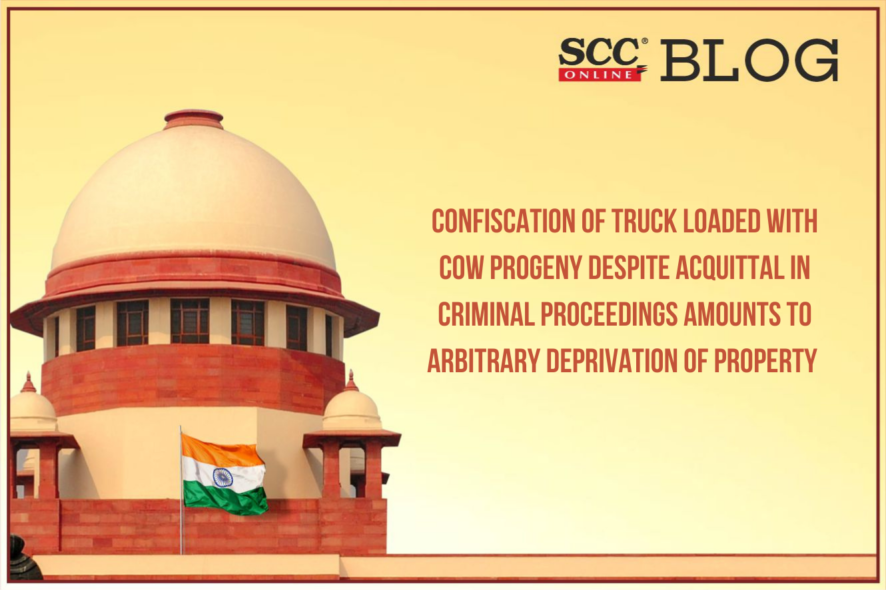Supreme Court: In a case where the District Magistrate had directed confiscation of a Truck under the M.P. Prohibition of Cow Slaughter Act, 2004 despite the criminal proceedings having culminated into acquittal, the bench of KM Joseph and Hrishikesh Roy*, JJ has held that in a case where the offender/accused are acquitted in the Criminal Prosecution, the judgment given in the Criminal Trial should be factored in by the District Magistrate while deciding the confiscation proceeding.
Explaining the scheme of the 2004 Act read with the provisions of CrPC, the Court observed that the objective of the M.P. Prohibition of Cow Slaughter Act, 2004 is punitive and deterrent in nature. Section 11 of the 2004 Act and Rule 5 of M.P Govansh Vadh Pratishedh Rules, 2012, allows for seizure and confiscation of vehicle, in case of violation of sections 4,5,6, 6A and 6B.
“The confiscation proceeding, before the District Magistrate, is different from criminal prosecution. However, both may run simultaneously, to facilitate speedy and effective adjudication with regard to confiscation of the means used for committing the offence.”
Further, the District Magistrate has the power to independently adjudicate cases of violations under Sections 4, 5, 6, 6A and 6B of the 2004 Act and pass order of confiscation in case of violation. However, in a case where the offender/accused are acquitted in the Criminal Prosecution, the judgment given in the Criminal Trial should be factored in by the District Magistrate while deciding the confiscation proceeding.
Hence, applying the aforementioned law at the case at hand, it was held that the appellant’s truck, loaded with cow progeny, was confiscated on account of the criminal proceedings alone and therefore, under the applicable law, the vehicle cannot be withheld and then confiscated by the State, when the original proceedings have culminated into acquittal. Noticeably, it is also not the projected case that there is a likelihood that the appellant’s truck will be used for committing similar offence.
In the present case, the order of acquittal was passed as evidence was missing to connect the accused with the charges.
“The confiscation of the appellant’s truck when he is acquitted in the Criminal prosecution, amounts to arbitrary deprivation of his property and violates the right guaranteed to each person under Article 300A. Therefore, the circumstances here are compelling to conclude that the District Magistrate’s order of Confiscation (ignoring the Trial Court’s judgment of acquittal), is not only arbitrary but also inconsistent with the legal requirements.”
The Court also rejected State Counsel’s submission that the burden of proof is on the truck owner in the process of confiscation, and observed that Section 13A of the 2004 Act, which shifts the burden of proof, is not applicable for the confiscation proceedings but for the process of prosecution. By virtue of Section 13A of the 2004 Act, the burden on the State authority to legally justify the confiscation order, cannot be shifted to the person facing the confiscation proceeding.
“By reason of an order of confiscation, a person is deprived of the enjoyment of his property. Article 300A of the Constitution provides that no person shall be deprived of his property save by authority of law. Therefore, to deprive any person of their property, it is necessary for the State, inter-alia, to establish that the property was illegally obtained or is part of the proceeds of crime or the deprivation is warranted for public purpose or public interest.”
[Abdul Vahab v. State of Madhya Pradesh, 2022 SCC OnLine SC 262, decided on 04.03.2022]
*Judgment by: Justice Hrishikesh Roy
Counsels
For appellant: Advocate Pulkit Tare
For State: Advocate Abhinav Shrivastava







